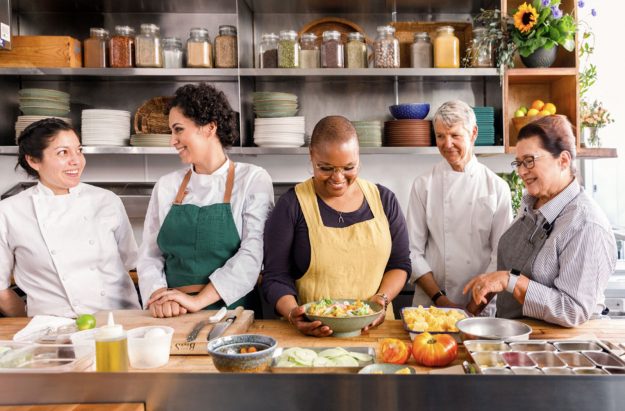“We reflect on the effort that brought us this food / and consider how it comes to us.”
So goes the pre-meal chant at San Francisco Zen Center (SFZC), a version of which is recited at Zen centers all over the world. For Bay Area residents and foodies, Buddhist or not, perhaps nowhere is this contemplation easier to do than at Greens, SFZC’s all-vegetarian fine dining restaurant that has embodied the farm-to-table movement since the seventies. Now a Bay Area institution, Greens is celebrating its 40th anniversary this year.
“We’ve had the right concept for 40 years,” said executive chef Denise St. Onge. “There are so many things that this restaurant has gotten right.”
Among those things has been casting vegetables in the starring role of any Greens meal.
“Greens celebrates the vegetables for themselves, not just as a side dish to fill up the plate,” said Linda Galijan, president of SFZC. The centerpieces of Greens’ current lunch menu, for instance, include a wild mushroom panini, a masala curry with tofu, and a broccoli pizza.
Almost all of Greens’ ingredients are sourced from local farms, including SFZC’s own farm, Green Gulch, just north of San Francisco. (Only specialty items like Parmesan are imported.) What’s cooked each week at the restaurant can vary based on Green Gulch’s harvest, which is dependent not only on seasonal variations but also on its all-volunteer community. What Green Gulch doesn’t have available, St. Onge fills through other suppliers, visiting three farmer’s markets per week and sometimes even going with her staff to Green Gulch to “get our hands dirty and help pick the vegetables out of the ground.”
Perhaps the only American Buddhist center with a critically acclaimed restaurant attached, the idea of Greens was first raised in 1975, when Richard Baker, the successor of founder Shunryu Suzuki, was abbot, and SFZC was developing many different businesses—an ambitious extension of the center’s mandate that was not without friction. (Baker resigned as abbot in 1984, after sexual relationships with several students came to light.)
From the beginning, there was a vision for what Greens would be—a spot on the bay, with big windows overlooking the Golden Gate Bridge—before an actual site had been identified. And in 1979, Greens opened with floor-to-ceiling views of the San Francisco Marina.
In the early days, Greens was staffed by SFZC students in residence. But as it became clear that late-night restaurant schedules and early-morning zazen call times were not conducive and the students pushed back against the low pay for their work, SFZC withdrew from running day-to-day operations and professionalized the business. Greens remains an important source of fiscal support for the center to this day.
Now, some Greens’ employees have a Zen practice while others do not, but staff training, under the guidance of general manager Min Kim, is grounded in Buddhist principles.
Unlike many workplaces in the cutthroat restaurant industry, “There’s a lot of love given from one person to the other, from the front of house to the back of the house. Everybody really respects each other here, and that’s a culture that’s been in place for a long time,” said St. Onge. Some servers and kitchen staff have been at Greens for “years and years,” said Galijan. “That kind of loyalty in restaurant staff is rare.”
After Greens’ first head chef, Deborah Madison, Annie Somerville served as executive chef for over 30 years—from 1985 until the summer of 2018, when St. Onge took over.
“My first goal is to preserve and sustain the restaurant, and then evolve it the way that it needs to evolve,” said St. Onge. That means staying true to the values of Chef Somerville, who eschewed fake meats or genetically modified vegetables. But St. Onge, who was raised in the Thai Theravada Buddhist tradition, is also bringing new flavors, inspired by her background, to the table—papaya salad, dumplings, and dishes featuring yuba, a soy milk byproduct often known as tofu skin that is popular in many parts of Asia.
And to celebrate 40 years of elevating the vegetarian dining experience, Greens has tasked six local guest chefs with creating a vegetarian meal after their own style, a special dinner format that began in July and will run through December.

“It’s a good challenge for me!” said Pam Mazzola, December’s guest chef and a lead chef at the restaurant Prospect (and where St. Onge used to be sous chef). “How do I satisfy and give people a complete meal without the normal protein?” She’s still working on the answer, but for now, it entails cabbage stuffed with mushroom filling, baby parsnips in brown butter, and violin squash risotto with shaved truffles.
“The fact that [Greens] is relevant after 40 years is a really amazing thing,” she added. It’s not just the always-slim margins of the restaurant industry or the rising costs of San Francisco that Greens has defied—three days before St. Onge began her tenure in 2018, a fire shut down the restaurant for four months.
Perhaps what has helped sustain Greens is its embeddedness in the community. In the mid-nineties, when St. Onge’s mother was battling cancer, she adopted a vegetarian macrobiotic diet, and the family would come to Greens to eat lunch or to pick up food for the house.
“The interesting thing,” said St. Onge, “is that my story is not really special. A lot of the guests who come in . . . have a similar relationship with this restaurant.”
“It’s not a place just to eat at,” Galijan said, “but to be nourished, renewed, and restored.”
♦
Further reading: If you enjoyed this article, you may want to check out Zen teacher and writer Gesshin Claire Greenwood’s essay on making the most of your leftovers, a guide to how paying attention to food can help your overall practice by Tibetan Buddhist nun Thubten Chodron, and this article on oryoki, the codified way of Zen eating.